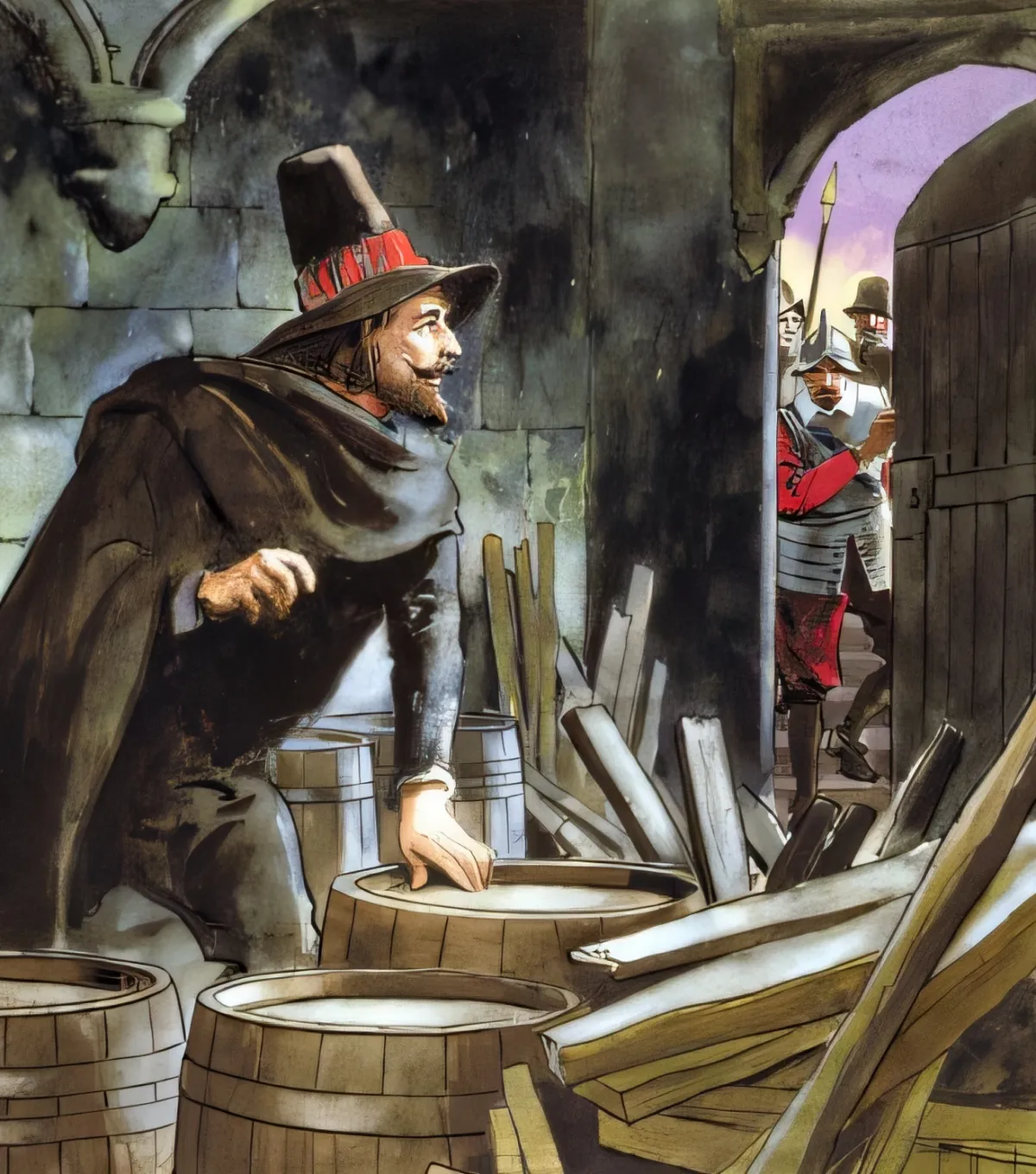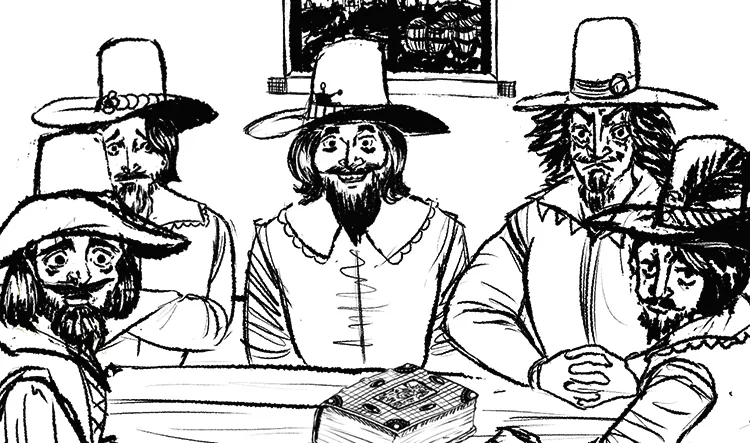When Did Bonfire Night Become A Tradition?
Remember, remember!
The fifth of November,
The gunpowder treason and plot.
I know of no reason
Why the gunpowder treason
Should ever be forgot!
Every year on the 5th of November people and communities all over the UK let off fireworks and burn bonfires with effigies of a man called Guy Fawkes sitting at the top. But why do we do this? Out of context, this seems like a very odd practice. However, it is actually the way we celebrate a very specific anniversary; it is to mark the day a rebel group’s plan to blow up the Houses of Parliament was foiled. And it’s all thanks to a letter.
Robert Catesby

During the reign of Queen Elizabeth I, from 1558 to 1603, Catholicism in England had been repressed. After her death, many Catholics hoped that the situation would improve because the new king, James I, was the son of Mary Queen of Scots who had been Catholic. Unfortunately, James, I was Protestant and continued to persecute them.
The constant oppression led to the Catholic Robert Catesby plotting to kill the new king and his establishment. Catesby had already got himself involved with the rebellion of the Earl of Essex against Queen Elizabeth I’s chief advisor, however, he didn’t achieve the outcome he wanted. He was injured, fined, and imprisoned.
That was not enough to stop him, though. In 1602 he was rumoured to have been having discussions with the Spanish government trying to get their help to start a rebellion. Unfortunately for him, the Spanish weren’t too eager and so Catesby decided to come up with his own plan to murder the king and all of parliament, hoping to instigate an uprising and eventually put a Catholic monarch back on the English throne. This was the Gunpowder Plot.
The Gunpowder Plot

Apparently, Catesby was very charismatic and easily recruited a number of people to support his cause, including brothers John and Christopher Wright, and Thomas Winter. The first stage of their plan quickly came together; they would hide barrels of gunpowder under the House of Lords and, on the opening day of parliament, blow up the government and the new King of England. However, there was one thing missing from their plan, an explosives specialist. Cue Guy Fawkes.
Guy Fawkes

Guy Fawkes was a devout Catholic who travelled to Europe to fight in the Eighty Years’ War on the side of Catholic Spain against the recently established Dutch republic. He became a junior officer and had been put forward for a captaincy by 1603.
While in Spain, he tried to gain their support to start a Catholic rebellion in England but, like Catesby, was unsuccessful. It was there, though, that he came into contact with Thomas Winter who introduced him to Robert Catesby and made him aware of the Gunpowder Plot, leading him to join the group in 1604.
Putting the plan into action

The Duck and Drake Inn was the first meeting place of the main plotters, and they gathered on 20th May 1604. One member of the group, Thomas Percy was able to gain access to a house in London after being employed as a Gentleman Pensioner: a bodyguard of the British monarch and appointed Fawkes as a caretaker there under the pseudonym John Johnson.
At some point, they also purchased the lease to an under-croft (cellar or storage room) that was conveniently located right underneath the House of Lords. They got to work and, over time, hid a total of 36 barrels of gunpowder there by mid-July; unfortunately for them, the opening of parliament was delayed due to the risk of the plague and was rescheduled to the 5th of November. Not wanting to sit and twiddle his thumbs, Fawkes returned to Europe again to try and get foreign support, but he was unsuccessful.
In August 1605 Fawkes and Wintour discovered that the gunpowder had decayed, so the group had to smuggle more in, using firewood to disguise it. After several meetings in October, it was concluded that Fawkes would be the one to light the fuse and then escape across the Thames out of harm’s way.
The Letter

Although all the conspirators were on board with the plot to kill the protestant king, some were worried about their Catholic brothers who would be at the opening of parliament, and therefore present when the Houses of Parliament blew up.
On the 26th of October 1605, an anonymous letter was sent to Catholic Lord Monteagle warning him to stay away from parliament and revealing the intention to blow it up.
Although the plotters became aware of the existence of the letter quickly, they decided not to change their plans as they believed the letter would be viewed as a hoax and not taken seriously.
However, Monteagle showed the letter to King James I who ordered a search of the cellars beneath Parliament to be conducted. The search took place in the early hours on November 5th and Fawkes, who had stationed himself the night before, was discovered with the gunpowder, armed with a slow match and watch.
Torture and interrogation

When first interrogated, Fawkes gave them his alias, John Johnson, along with a fictional background, claiming to come from Yorkshire. He did, however, proudly admit that he had planned to blow up parliament and was disappointed that he failed to do so. This, apparently, earned him some admiration from the King who complimented his resoluteness.
Nevertheless, King James ordered ‘John Johnson’ to be tortured the next day until he revealed the names of his associates. The room Guy Fawkes was tortured in is now known as the Guy Fawkes Room. It wasn’t until the 7th of November that Fawkes revealed his real identity and the number of people involved in the plot, and on the 8th he revealed their names.
The End

After the plot was discovered, Catesby, Percy, and several others fled and tried to start a rebellion in the Midlands. They managed to get to Holbeach House, a house in Staffordshire but were injured in a gunpowder accident there.
Despite this, they decided to go down fighting and struggled against the authorities when they arrived. During the battle, the same musket ball hit both Catesby and Percy, and although efforts were made to prolong their lives so they could be interrogated back in London, both died.
On Monday 27th January 1606, eight plotters, including Guy Fawkes, were tried. Strangely Fawkes pleaded not guilty, even though he had made no attempt to conceal his actions after his apprehension. The defendants were found guilty of high treason and were sentenced to be hanged, drawn, and quartered, they would then be beheaded and have dismembered parts of their bodies displayed.
On the 31st of January 1606, Fawkes, Winter, and two others were taken to the Old Palace Yard at Westminster, and Fawkes’s companions were hanged and quartered. Fawkes was the last to have his sentence carried out and reportedly asked the King and state for forgiveness but received none.
As he began to climb up to the noose, however, he either accidentally climbed too high or jumped to his death, either way, Fawkes was able to avoid being quartered as he broke his neck. Although his body was quartered anyway.
Bonfire Night

After Fawkes’s apprehension and the foiling of the Gunpowder Plot on the 5th of November 1605, Londoners were encouraged to light bonfires as a way of celebrating the King’s escape from death. This was followed by an Act of parliament passed in January 1606 called the Observance of 5th November Act 1605, marking the 5th of November as a day to commemorate the Gunpowder Plot failure.
The burning of bonfires was joined by the lighting of fireworks in the 1650s and after 1673 it became customary to burn an effigy too. The Act was dissolved in 1859, but the celebrations carried on as a British tradition.
Although Guy Fawkes was not the leader of the Gunpowder Plot conspirators, he has become synonymous with Bonfire Night, and the effigy made for the top of the bonfire is usually made in his image.
Bonfire Night, or Guy Fawkes Night as it’s otherwise known, is a very specific and rather strange British tradition, but it’s embedded in our history and great fun too. Especially in my hometown which is well-known for its bonfire, fireworks, and other festivities, so much so that people from other areas come to see it.
Is it a little morbid that it’s customary for school children to make the Guy for the fire? Maybe. But I still remember making the Guy with great fondness and always making sure to travel home for Bonfire Night.
Opinions and Perspectives
Wonder what Fawkes would think about becoming such a famous historical figure.
Its fascinating how different towns have developed their own unique bonfire night traditions.
The amount of planning they put into this plot is astounding, even by todays standards.
Learning about this in school never covered the complex religious politics behind it all.
The way communities come together for bonfire night reminds me of other historical celebrations.
Its amazing how much detail survived about the plot. The record keeping was incredible.
Always wondered about the psychological impact on the guards who found Fawkes that night.
The persistence of these traditions really shows how deeply this event affected British society.
Penny for the Guy used to be such a big thing when I was young. Dont see kids doing that anymore.
I find the Spanish angle fascinating. Shows how international politics played a role.
Never realized how young some of the plotters were. Really puts it in perspective.
Anyone else think it's remarkable how accurate the historical records are from this period?
My kids love making the Guy, but I always feel a bit strange explaining why we burn it.
The way they got access to the cellar seems almost too easy by today's standards.
Your point about the military experience is spot on. These weren't amateurs by any means.
Actually visited the Guy Fawkes Inn in York. Really brings history to life seeing these places.
The detail about checking the gunpowder quality shows how methodical they were in their planning.
Interesting how Fawkes gained military experience in Europe before the plot. He wasn't just some random guy.
Remember learning the poem in school but never really understood the significance until much later.
You can still visit many of these historical sites today. I've been to the Parliament cellars.
The tradition of building community bonfires really brings people together. That's my favorite part.
Never knew about the gunpowder accident at Holbeach House. Seems like poetic justice.
It's quite something that we turn such a dark historical event into a family celebration.
What puzzles me is why Fawkes pleaded not guilty at trial after admitting everything during torture.
We really should remember the warning signs. Religious persecution often leads to desperate actions.
The way the plotters met at the Duck and Drake Inn sounds like something from a movie.
I'm surprised more people don't know about Catesby being the leader. Schools should teach the full story.
People complain about fireworks now, but imagine living in London when this actually happened!
The detail about Fawkes carrying a slow match and watch when caught really brings the scene to life.
Makes you think about how different British history would be if they had succeeded.
The original Act of Parliament making it a celebration is interesting. Wonder what other historical events were legally required to be remembered?
I love how local communities still make this such a big event. Our town's bonfire is always spectacular.
Just learned about the musket ball hitting both Catesby and Percy. What are the odds of that happening?
Growing up Catholic, this story always made me feel a bit uncomfortable during school celebrations.
True, but blowing up Parliament wasn't exactly going to win hearts and minds, was it?
I find it sad that they were fighting for religious freedom, even if their methods were completely wrong.
The fact that Fawkes used an alias and stuck to his story initially shows how committed these plotters were.
Imagine being the person who had to search those cellars. Must have been terrifying knowing what they might find.
My parents always told me different versions of the story when I was growing up. Never knew the full history until now.
The King actually admiring Fawkes for his determination is such an interesting detail. Respect between enemies.
Does anyone else find it ironic that we celebrate with fireworks when the whole plot involved explosives?
I wonder if Lord Monteagle ever revealed who sent him that letter. Such a crucial piece of the story.
They must have been pretty confident to ignore the warning about the letter. That overconfidence really cost them.
The anonymous letter was really their undoing. Always found it interesting how one act of conscience changed everything.
It's fascinating how they used firewood to hide the extra gunpowder. These guys really thought everything through.
The plague inadvertently gave them more time to prepare, but it still wasn't enough. Sometimes fate works in mysterious ways.
I had no idea the Spanish connection was so strong. Both Catesby and Fawkes tried to get their support separately.
My grandparents tell me Bonfire Night used to be much bigger in their day. Everyone would save up wood for months before.
Anyone else find it interesting that fireworks weren't part of the celebration until the 1650s? I always assumed they were there from the start.
I grew up making Guy effigies at school. Looking back now, it seems pretty weird that we got kids to make dolls to burn!
The part about Fawkes jumping to his death rather than face the full punishment shows incredible determination, even at the end.
Reading about the torture room gives me chills. Can't believe it's still called the Guy Fawkes Room to this day.
Actually, we're not celebrating the plotters. We're celebrating the fact that Parliament and the King survived. Big difference!
I always wondered why we celebrate someone failing to blow up Parliament. The whole tradition seems a bit dark when you really think about it.
What strikes me most is how Catesby was actually the mastermind, yet Guy Fawkes became the face of the whole thing. Talk about stealing the spotlight!
Amazing how this tradition has survived for over 400 years. I find it fascinating that we still commemorate a failed plot from 1605!
